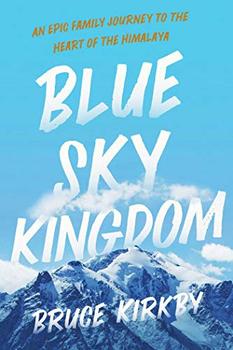Summary | Excerpt | Reading Guide | Reviews | Beyond the Book | Readalikes | Genres & Themes | Author Bio

An Epic Family Journey to the Heart of the Himalaya
by Bruce KirkbyPROLOGUE
Attention is the rarest and purest form of generosity ...
Himachal Pradesh
Northern India
Lumbering trains carried our family westward across the Indian Plains. The terrific heat of summer had descended, and our days dissolved into a mirage of dust, tightly pressed bodies, greasy curry and children's storybooks.
"Way too smelly," our young boys would groan as the tang of perspiration and urine rose in unison with the thermometer.
So we surrendered our seats, choosing instead to stand before open carriage doors, braced together against the wind, watching the country race past: teeming streets, brick factories, rice paddies, water buffalo, egrets on the wing. And late each afternoon, just as the sun's final embers drifted from the sky, I spotted dark clouds gathering on the horizon—looming a little closer each day, as if pursuing us.
But it wasn't until we reached the foothills that the fever broke. We were crammed into a dilapidated bus, bouncing up steep mountain roads scarred by rockfall, when a wave of cool air crashed over us. Moments later, heavy drops began hammering on the roof. With faces pressed against foggy windows, our boys watched as the surrounding hillsides were obscured behind silver monsoon curtains. In terraced fields, farmers scampered beneath umbrellas of oak and chestnut, and along roadside ditches, groves of head-high marijuana bowed to the deluge.
Inside the former British hill station of Manali, tarps were hastily yanked over market stalls. Horns beeped, dogs barked and foreigners in fluorescent jackets darted down cobblestone alleys, between trekking agencies, Germanstyle bakeries and cybercafés. Overhead, thickets of hand-painted signs, satellite television dishes and tangled power lines obscured the hemorrhaging skies, so profuse they reminded me of rainforest foliage. Long before this deep valley became lionized as a stoners' paradise, it was known among Hindus simply as Kulantapith—or "the end of the habitable world."
It certainly wasn't that anymore.
Exhausted and fighting the flu, the four of us took refuge in a stone cottage tucked amid the crooked temples and stooped shanties of Old Town, where orchards of apple and plum gave way to mountainsides of cedar and mist. Packed together into one small bed, we read aloud The Berenstain Bears and Too Much TV while sipping ginger tea. Then Richard Scarry's Busy, Busy World. Then Bill Peet's Wump World. Outside an open window, the downpour intensified.
Long after our boys had drifted off to sleep, my wife and I worked beneath a bare lightbulb. Slowly and steadily we sorted a tangle of gear and supplies into two piles. The bigger mound—things we once thought we needed but actually didn't—would be abandoned. The smaller pile held just the essentials: everything required to survive three months amongst the world's highest peaks.
The next day, a minivan would carry us north, over soaring passes, toward an unmarked trailhead. From there, we would set out by foot, crossing the spine of the Great Himalaya Range and plunging into that swirl of summits and contested borders where China, Pakistan and India collide. Our destination was Karsha Gompa, a thousand-year-old Buddhist monastery barnacled to cliffs above the union of two great rivers—our home until winter.
In an adjacent room, door slightly ajar, both boys slept soundly with a fan blowing on them, cheeks flushed and sheets cast aside. Chestnut-haired Bodi was seven. Angular and lanky like a caribou, he was a thoughtful boy and exceptionally bright—hesitant around strangers and a stickler for routine. Three-year-old Taj was Bodi's foil—blond, carefree and giggly. His easy manner had drawn others to him from the earliest days.
Excerpted from Blue Sky Kingdom by Bruce Kirkby. Copyright © 2020 by Bruce Kirkby. Excerpted by permission of Pegasus Books. All rights reserved. No part of this excerpt may be reproduced or reprinted without permission in writing from the publisher.
Your guide toexceptional books
BookBrowse seeks out and recommends the best in contemporary fiction and nonfiction—books that not only engage and entertain but also deepen our understanding of ourselves and the world around us.